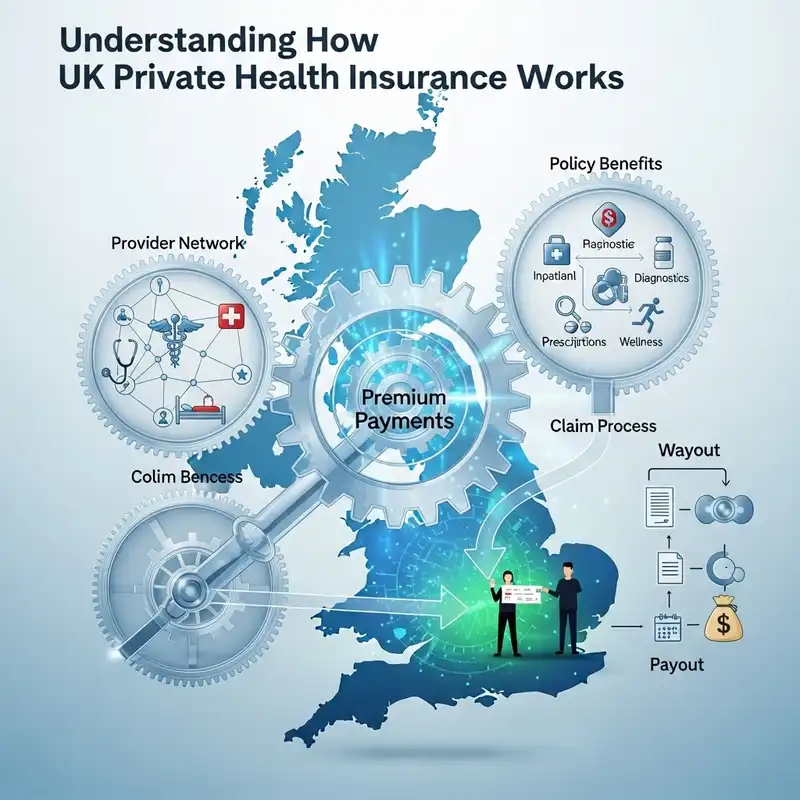TL;DR
Private Healthcare in the UK: A Comprehensive Guide If you have always relied solely on the National Health Service (NHS) for your medical needs, the concept of paying for private treatment might be unfamiliar territory. However, as wait times for NHS care continue to increase, more individuals are actively considering the option of seeking private healthcare. This comprehensive guide aims to walk you through the process of accessing private medical services in the United Kingdom, complemented by valuable insights from experts at WeCovr.
Key takeaways
- Distinguishing private treatment from the NHS
- Already requiring treatment? Here's what you need to know
- Exploring payment options for private healthcare
- Navigating private treatment without health insurance
- Understanding fixed price surgery schemes
Private Healthcare in the UK: A Comprehensive Guide
If you have always relied solely on the National Health Service (NHS) for your medical needs, the concept of paying for private treatment might be unfamiliar territory. However, as wait times for NHS care continue to increase, more individuals are actively considering the option of seeking private healthcare. This comprehensive guide aims to walk you through the process of accessing private medical services in the United Kingdom, complemented by valuable insights from experts at WeCovr.
This guide will address the following topics:
- Distinguishing private treatment from the NHS
- Already requiring treatment? Here's what you need to know
- Exploring payment options for private healthcare
- Navigating private treatment without health insurance
- Understanding fixed price surgery schemes
- A look at private hospitals in the UK
- Evaluating the cost of private medical treatment
- Demystifying private medical insurance
- How does private health insurance function?
- The benefits of obtaining a free consultation from WeCovr's health insurance experts
You Have a Choice Regarding Your Medical Care
When visiting your general practitioner (GP) for a medical condition requiring further investigation, they will typically refer you for diagnostic tests or scans to establish a diagnosis before recommending specialist treatment. Depending on the treatment required, you may find yourself facing a waiting period on a list. However, under the NHS Patient Choice Programme, healthcare providers are obligated to inform you of your treatment options, including the possibility of pursuing private treatment if you prefer.
A recent report from the Office for National Statistics (ONS) and the NHS has uncovered that waiting lists for appointments, tests, and treatments within the NHS are significantly longer than previously thought, affecting millions of people across the country.
- 9.7 million individuals are waiting for NHS treatment.
- 1.4 million people have waited over a year for an appointment.
- 7 million are currently awaiting NHS appointments.
- 1 in 5 people in England are on a waiting list.
- 5 million individuals find it difficult to get a GP appointment.
- 670,000 people have been waiting for over 18 months.
If faced with such an extended wait for NHS treatment, you might assume that having private health insurance is the only way to access private healthcare. While this is certainly one option, you could alternatively choose to utilise a portion of your savings to cover the typical cost of about £13,000 for a private hip replacement. Alternatively, you could opt for a private medical loan to spread the cost of your treatment over a more manageable period.
How Private Treatment Differs from the NHS
When you decide to pursue private healthcare, you gain access to a broader range of choices compared to the NHS. Firstly, you have greater control over who provides your treatment. If you are aware of a specific consultant who excels in treating your condition, you have the freedom to choose to be treated by that individual. You can select your consultant based on their reputation and feedback from previous patients. Websites like Doctify collate patient feedback about healthcare practitioners, enabling individuals to make informed decisions about their care.
Of course, it is also crucial to consider the consultant's availability and fees. The best consultant in their field might not be available for several months or may charge significantly higher rates due to their expertise and demand. Nevertheless, by opting for private healthcare, you have greater control and can weigh various factors before making a decision.
Additionally, there is a wide range of private healthcare providers across the UK who can treat you at either an NHS or private hospital. You can choose a provider based on convenience, cost, a particular consultant, or a combination of these factors.
Regardless of the option you choose, you will have quicker access to treatment compared to the NHS route. The treatment itself may also differ. Many private hospitals can offer drugs and treatments that are not currently available through the NHS. Some providers also allow direct access to consultation appointments, potentially enabling you to receive a diagnosis more quickly than if you had waited for a GP appointment through the NHS.
Do You Already Require Treatment?
If you have already received a diagnosis, you might be wondering about your options if you do not have a health insurance plan in place.
Health insurance providers automatically exclude any pre-existing medical conditions that you have when you take out the policy. This means that you will not be able to obtain health insurance coverage for the condition you've been diagnosed with or any other health issue that has required treatment in the past five years.
However, the good news is that you can still access private healthcare if you have the financial means to pay for it yourself.
Exploring Payment Options for Private Healthcare
In the United Kingdom, there are three primary ways to pay for private healthcare. You can utilise private medical insurance, pay for the treatment costs directly out of pocket, or take out a personal medical loan. In the following section, we will explore these three main avenues for accessing private healthcare in the UK.
Private Medical Insurance
Private medical insurance policies allow you to pay a monthly premium and gain access to private treatment, as long as your policy covers the specific condition or procedure. You may also receive private health insurance as part of your employee benefits package, with your employer covering the health insurance premium. This arrangement enables you to receive private medical care and return to work more quickly. Health insurance is only suitable for conditions that you may be diagnosed with in the future. Private health insurance automatically excludes any medical conditions you've been treated for in the past five years. This means that if you've already received a diagnosis, it will be excluded from your health insurance coverage as a pre-existing condition. Some health insurance policies will require details of your medical history when you take out the policy and exclude any pre-existing medical conditions upfront. In contrast, others will investigate when you make a claim.
If you need treatment immediately, medical insurance won't be able to provide assistance, although it might remain valuable to consider acquiring health insurance for future medical requirements.
Self-Funding
If you lack health insurance or need treatment for a condition not covered by your medical insurance, it may be prudent to allocate a portion of your savings for prompt treatment. There are several approaches to consider. Many private healthcare providers offer fixed price quotes for necessary treatments, which can encompass initial consultations, specialist surgeries, rehabilitation, and specialised medications.
When comparing quotes from multiple providers, ensure they all provide the same services and inclusions before making a decision on where to seek treatment. Additionally, some providers offer a pay-as-you-go option for treatments with less predictable durations or costs. This flexible option allows you to switch providers or return to the NHS based on your needs and budget.
Personal Medical Loan
Perhaps you cannot access private healthcare through medical insurance, and you do not have the funds immediately available to pay for private medical care out of pocket. In this case, your third option is to take out a personal medical loan. Most UK private hospitals offer loans through a third-party finance provider. It is crucial to carefully examine the terms of each loan and the total cost to you. We would also suggest that you verify that the financial conduct authority regulates the finance company. There is nothing preventing you from taking out a regular personal loan if the terms and overall cost are more favorable. Of course, any loan will only be possible if you meet the proper criteria for credit approval.
According to WeCovr's experts, "When considering a personal medical loan, it's crucial to carefully review the terms and conditions. Look for options that offer competitive interest rates and flexible repayment periods to ensure the loan fits your financial situation."
Navigating Private Treatment Without Health Insurance
If you've decided you're ready to access private treatment but do not have private medical insurance, here's the process you can expect to follow:
1. Consult with your NHS GP or a Private GP
Firstly, schedule an appointment with your GP. This step applies even if you have a private medical insurance policy, as most insurers require a GP referral before they approve further treatment. Your GP can recommend a particular specialist and write a referral letter directly to them. If you prefer to conduct your own research, you can identify the specialist you would like to be treated by and request that your GP refer you to them. Your GP may charge a fee to write the referral letter, so be prepared for that eventuality. Some healthcare providers allow you to pay to see a private GP, enabling you to choose that option if you prefer, particularly if appointments with your NHS GP are challenging to obtain.
2. Attend an Outpatient Appointment with a Consultant
Next, you will have an outpatient appointment with your chosen consultant. Some providers allow you to opt for your consultation appointments to take place face-to-face, over the phone, or via video call. If you require diagnostic tests or scans, these will be conducted during this appointment or arranged separately. If you need any further treatment, this will also be booked at this stage. You can expect to pay between £150 and £250 for this appointment. You will either be asked to pay this fee on the day or settle it soon afterwards. (illustrative estimate)
3. Obtain a Fixed Price Quote from the Hospital
Most private hospitals in the UK are typically able to provide you with a comprehensive fixed price quote that covers all aspects of your treatment plan. This quote will typically encompass the cost of the private surgical procedure itself, fees for the anaesthesiologist, nursing care expenses, and accommodation charges should you require an overnight stay at the hospital facility. WeCovr's healthcare experts strongly recommend conducting thorough research and comparing the offerings from various providers to ensure you obtain a quote that aligns with your specific needs and preferences.
4. Explore the Option of NHS Treatment by Your Private Consultant
It is crucial to recognise that there is often no clear-cut distinction between medical professionals practicing in the National Health Service (NHS) and those operating in the private healthcare sector. Many specialists who offer private consultations may also be affiliated with the NHS. Numerous private healthcare providers have established agreements with the NHS, enabling them to carry out treatments within NHS hospital facilities. WeCovr suggests inquiring with your consultant whether they have the capability to perform your treatment at an NHS facility as a private patient. Many NHS hospitals offer private patient access, with some ensuring that the private fees contribute directly to the care of NHS patients. This option could potentially be a more cost-effective alternative to receiving treatment at a dedicated private hospital.
5. Book Your Surgery
If the quoted cost exceeds your anticipated budget, or you decide not to proceed after your initial consultation appointment, you have the option to forgo the private treatment route and continue receiving care through the NHS. However, if you are satisfied with the quote and wish to proceed, your surgery date will be scheduled accordingly.
Depending on the payment terms outlined by your healthcare provider, you may be required to pay the full cost or a portion of it prior to being admitted for treatment. If you have chosen to finance the treatment through a loan with monthly installments, your finance provider will arrange for the payment to be made on your behalf. Additionally, you will be advised on the procedures and protocols to follow on the day of your surgery, including any pre-operative blood tests or medications that may increase the chances of a successful surgical outcome.
6. Post-Surgery Follow-Up
After your surgery or treatment has been completed, your consultant or the hospital will provide a comprehensive update to your General Practitioner (GP) regarding your progress and recovery. You will also have a follow-up appointment scheduled with your consultant to ensure that your recovery is progressing as expected. If your treatment package includes follow-up rehabilitation services, these will commence after your surgery as well.
7. Anticipate Additional Costs
Your rehabilitation process is an integral part of your overall treatment plan, and it can play a crucial role in helping you achieve a full recovery, particularly if you have undergone treatment for a severe illness. Your consultant may have advised you about any post-operative care you might require, such as physiotherapy or other rehabilitation services. If you chose not to receive these services at the private hospital, perhaps due to location inconvenience or other factors, you will need to make separate arrangements. WeCovr recommends discussing your options with your GP, but it is essential to budget for potential additional costs associated with arranging these services privately.
What are Fixed Price Surgery Schemes?
Many private hospitals in the UK offer fixed price surgery schemes, which provide a comprehensive and predictable cost structure for your treatment. These schemes typically include all associated expenses, such as consultant fees, surgical costs (including the operating theatre), anaesthesia charges, nursing care (both during and after surgery), medications, and the cost of your hospital stay. Following your initial consultation with a specialist, the quote you receive should encompass all of these elements. Some providers even include post-operative aftercare as part of the overall fixed price package. These schemes allow you to access private healthcare at a predictable cost, without any unexpected surprises on your final invoice. If you need to secure a loan to spread the cost of your treatment over monthly installments, a fixed price surgery scheme will enable you to accurately assess the affordability of the loan.
Private Hospitals in the United Kingdom
When considering private medical insurance policies, your insurance provider will typically provide a list of approved hospitals and treatment centres from which you can choose. While there are a few independent private hospitals operating in the UK, the majority of private healthcare services are offered by large healthcare groups. However, if you are paying for your healthcare costs directly, you have the freedom to choose any provider. Here is a rundown of some of the leading companies operating in the UK, as recommended by WeCovr's experts:
HCA Healthcare
HCA Healthcare UK(hcahealthcare.co.uk) entered the British healthcare market in 1995, following its origins in Nashville, USA. Since then, it has established a world-class network of over 30 facilities across London and Manchester, with a recent expansion into Birmingham in 2023. As the largest private healthcare provider globally, HCA Healthcare is also a leading force in the UK’s private healthcare sector. HCA Healthcare’s philosophy revolves around patient-led care. They prioritise compassion, respect, and inclusion, ensuring that patients receive treatment as if they were their own loved ones. Their services cover a wide spectrum, including a private GP service, various therapies, and surgical treatments. Whether you need medical advice, rehabilitation, or surgical intervention, HCA Healthcare has you covered. HCA hospitals are strategically situated in major city centres, such as London and Manchester. This accessibility ensures that patients can easily access high-quality healthcare services. Through their partnership with the NHS, HCA Healthcare patients have the flexibility to receive treatment in both private and NHS settings. This collaboration expands options for patients and enhances overall healthcare delivery. If you’re using private health insurance, it’s essential to check the terms of your insurance coverage to make informed decisions about your healthcare options as some policies may have an additional premium to utilise HCA hospitals. In summary, whether you’re seeking preventive care, diagnosis, or treatment, HCA Healthcare is dedicated to getting you back to doing the things you love as quickly as possible.
Spire Healthcare
When you select Spire Healthcare(spirehealthcare.com), you’ll receive treatment at one of their dedicated centres, which include 39 hospitals and 8 clinics across the UK. Their comprehensive range of services covers surgical treatments, rehabilitation therapies, health checks, and medical screenings. Whether you’re dealing with allergies, ear, nose, and throat issues, or require cancer treatment or spinal surgery, Spire Healthcare has you covered. They offer fixed price packages, ensuring a predictable cost structure. Additionally, you have the flexibility to pay in monthly installments through their finance options. Notably, even if you’re receiving treatment through the NHS, there’s still an opportunity to choose Spire hospitals if a cooperative agreement is in place.
Nuffield Health
Nuffield Health(nuffieldhealth.com), the United Kingdom’s largest healthcare charity, has been working diligently for over 60 years to enhance the nation’s health and well-being. Their extensive network comprises 37 hospitals, 114 fitness and wellbeing centres, medical facilities, and workplace well-being services. Nuffield Health believes in a holistic approach to healthcare, focusing on both physical and mental well-being. They offer services ranging from personal training, health assessments, and GP consultations to mental health support and hospital treatments for serious conditions. Notably, Nuffield Health collaborates with the National Health Service (NHS) to prevent illness and injury. Their unique Programmes For All initiative addresses local health needs and widens access to their services, experts, and resources. Whether you’re seeking treatment for various conditions or lifestyle management options, Nuffield Health provides flexible payment options, including self-pay, interest-free personal medical loans, and health insurance coverage1. WeCovr’s experts also stress the importance of considering post-operative rehabilitation needs, as accurately predicting the required amount can be challenging when comparing quotes2. So, whether you’re looking for fertility treatment or comprehensive care from head to toe, Nuffield Health has you covered.
Circle Health Group
Circle Health Group(circlehealthgroup.co.uk), formerly known as BMI, operates 54 private hospitals across the UK, covering locations from Aberdeen to the West Sussex coast, ensuring an extensive nationwide presence. Their core philosophy centers around patient-focused care, and they take pride in their investments in cutting-edge technologies, such as artificial intelligence, robotics, and online booking systems. While online booking options are increasingly common among private healthcare providers, Circle Health Group stands out for its commitment to innovation. Notably, they offer a purpose-built rehabilitation facility, which can be particularly beneficial for patients requiring physical therapy instead of surgery or those in need of post-operative rehabilitation. 28 reviews on the NHS site ranging from one to five stars: NHS Circle Health reviews(nhs.uk).
Ramsay Health Care
Ramsay Health Care(ramsayhealth.co.uk), although perhaps unfamiliar to you, has been delivering private healthcare services in England since 1968. Their guiding principle revolves around providing top-notch care that ensures patients feel supported and well-informed throughout their treatment journey. You have the freedom to select your consultant, who will oversee your care alongside a dedicated private patient manager. This manager collaborates closely with the consultant and nursing team to ensure effective care management and timely updates. This personalised approach may be particularly attractive if you've encountered challenges in receiving timely treatment updates in the past. They have 8 ratings on the NHS ratings site(nhs.uk) as of the time of this writing: the majority are five stars, but there are a few one and two stars reviews there too.
Additionally, you can opt for an initial consultation in person, over the phone, or via video call, at your convenience. Ramsay Health Care offers a comprehensive range of treatments, both surgical and non-surgical, including sports injury services and private GP appointments. They provide fixed-price packages and even match prices against quotes from other providers. It's also possible that you could access treatment at Ramsay hospitals as an NHS patient.
If you'd like to find hospitals in your local area without navigating individual provider websites, WeCovr recommends using a website that allows you to enter your postcode. This will provide you with a list of nearby hospitals, along with details about their facilities, patient approval ratings, and Care Quality Commission ratings¹. Additionally, this website can help you locate specialist consultants in your vicinity.
How the major hospital chains compare based on their ratings
-
HCA Healthcare:
- HCA UK has received five 'Outstanding' ratings from the Care Quality Commission (CQC) for four of its Leaders in Oncology Care (LOC) practice locations and its Golders Green Outpatients and Diagnostics Centre(hcahealthcare.co.uk).
- The CQC provides an authoritative rating system, allowing like-for-like comparisons between providers. Each area is rated as Outstanding, Good, Requires Improvement, or Inadequate, and an overall rating is awarded for the entire facility(hcahealthcare.co.uk).
-
Spire Healthcare:
- Spire Healthcare has not yet received an overall rating from the CQC. However, individual patient reviews indicate positive experiences, such as good breast clinic care and understanding of patients' needs(hcahealthcare.co.uk)NHS ratings(nhs.uk) are available.
-
Nuffield Health:
- Nuffield Health has an excellent track record, with all its hospitals rated as 'Good' or 'Outstanding' by national regulators in England, Scotland, and Wales. In Scotland and Wales, there are no specific 'Outstanding' and 'Good' ratings like the CQC ratings in England, but Nuffield Health's hospitals in those regions have been assessed for safe delivery of patient care and leadership(hcahealthcare.co.uk).
- Patient reviews highlight great experiences with Nuffield Health, including positive interactions with staff and high-quality care(hcahealthcare.co.uk).
-
Circle Health Group:
- Circle Health Group has received positive patient reviews, with mentions of faultless treatment, professionalism, and attentive clinical teams(hcahealthcare.co.uk). It's always prudent to check their NHS reviews(nhs.uk) as well.
- All of Circle Health Group's hospitals have been rated 'Good' or 'Outstanding' by national regulators in 2022(hcahealthcare.co.uk).
-
Ramsay Health Care:
- Ramsay Healthcare UK Operations Limited has an average star rating of 4.5/5 across all its hospitals(hcahealthcare.co.uk).
- Patient reviews highlight exemplary care, professional staff, and faultless experiences during hospital stays(hcahealthcare.co.uk). It may also be useful to consider their NHS reviews(nhs.uk).
Remember that these ratings are based on various factors, including patient experiences, safety, and quality of care. It's essential to consider individual needs and preferences when choosing a healthcare provider. Always consult with your healthcare professional for personalised advice.
Evaluating the Cost of Private Medical Treatment
The cost of private healthcare in the United Kingdom varies based on several factors. These include the specific treatment required, the chosen provider, and the geographical location within the country. London tends to have higher prices compared to other regions in England and Wales.
However, these factors alone do not solely impact treatment costs. Hospitals must also consider expenses related to medical equipment, medications, staffing, insurance, technology, and facilities. Experienced consultants typically charge higher fees than newly qualified professionals, potentially translating to better quality treatment.
Procedure costs exhibit significant variation based on complexity. For instance, colonoscopies, wisdom tooth removals, tonsillectomies, or cataract surgeries typically range from £1,585 to £2,680. Laparoscopic hernia repairs or knee arthroscopies may cost around £3,000 to £4,000. The most complex surgeries, such as hip, knee, or shoulder replacements, can be between £13,000 and £14,000, according to experts from WeCovr.
If you are aware of the specific treatment you need, consider searching for associated costs in your local area. Providers like Spire, Nuffield, and Circle offer specialist treatments, and you can explore their nearest available hospitals by clicking on the relevant links above or speaking to WeCovr's experts today.
Understanding Private Health Insurance in the UK
What is Private Medical Insurance?
Private health insurance in the UK allows you to access private treatment when you need it. You take out a health insurance policy with a provider of your choice and pay health insurance premiums to cover you for different conditions and treatments. The coverage provided will vary depending on the specific private health insurance plan you choose. It is important to note that some conditions may be excluded from coverage due to pre-existing medical conditions in your history, as health insurance typically does not cover these. Private health insurance enables you to obtain prompt, high-quality hospital treatment without the need to shop around for the best price.
How Does Private Health Insurance Work?
Private health insurance is provided by various health insurance companies across the UK. You choose the insurer that offers the coverage that best suits your needs and begin paying health insurance premiums. When you require treatment, you contact your health insurance provider to initiate a claim. If your claim is approved, your insurer will arrange for you to start receiving treatment. Some insurers have their own network of private hospitals, while others work with both private and NHS treatment centers. They will inform you of the available treatment locations, allowing you to choose a facility that is convenient for you.
The claims process varies depending on the type of underwriting you have and whether you provided your insurer with details of your medical history when you took out your health insurance policy. If your insurer is already aware of any illnesses you have been treated for in the past, they will be able to provide a prompt decision. Otherwise, they will need to investigate further before confirming whether they will cover the treatment you require.
The Benefits of Consulting with a Health Insurance Broker
Private health insurance policies vary in terms of the level of coverage they provide and the benefits you can expect to receive. Some policies may include specific treatments, such as cancer treatment, as standard, while others may offer them as optional extras. Your individual needs and lifestyle will influence which health insurance policy is the most suitable for you. Some insurance policies allow you to add your entire family to your policy, while others offer incentives for healthy living. Additionally, you'll need to consider your budget. Options such as a no-claims discount or a higher excess on your health insurance plan can help reduce your premium. However, it is also worth considering private health insurance that does not base costs on your postcode or offers a scheme where individual claims do not increase your premiums.
WeCovr's experts recommend consulting with a health insurance broker to help you evaluate the type of private health insurance you might need and identify the policy that best suits your circumstances. This way, you don't have to spend extensive time navigating individual websites, trying to understand what each insurer covers.
At WeCovr, our guides are designed to assist you in considering the type of private health insurance that could be appropriate for you and the various factors you need to consider. When you contact us, we'll connect you with experienced advisers who will provide you with a personalised comparison quote and independent advice.
Sources
- Office for National Statistics (ONS): Inflation, earnings, and household statistics.
- HM Treasury / HMRC: Policy and tax guidance referenced in this topic.
- Financial Conduct Authority (FCA): Consumer financial guidance and regulatory publications.

































